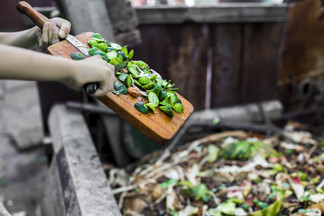Posted by Nora E. on 10th Jan 2021
The Importance of Composting and Its Benefits to The Lawn and Garden
Are you tired of feeling wasteful after throwing out food scraps? Do you want to do your part to help save the earth from pollution or just help your flowers and plants grow better? If so, then composting is the way to go. Composting is a way to make fertilizer that not only is great for plants, but also helps the environment and produces organic fertilizer. You may be asking yourself why this is necessary since you could easily just purchase fertilizer from your local gardening store. Using compost as a fertilizer is simply much more efficient and the truly sustainable option. Compost can really help the lawn and garden thrive.
Compost’s natural ingredients provide many benefits to the earth. Using compost improves soil structure, texture, and aeration, and increases the soil’s water-holding capacity. This means you are not only helping to produce organic fertilizer, but also helping the planet.
Some other benefits of compost to the lawn and garden include the following:
- Loosening clay soil;
- Increasing water-capacity in sandy soil;
- Improving soil fertility;
- Helping your plant’s roots grow healthier; and
- Providing food for microorganisms which in turn provides nitrogen, potassium, and phosphorus for your soil in a natural and healthy way.
Compost not only helps your garden become more sustainable, but also has a significant impact on our planet.
It is pretty much common knowledge that our landfills are overflowing and we simply do not have space for new sites. However, with composting, we are able to use organic material that may have otherwise gone to waste and contributed to the pollution of our planet. There is an urgent need to develop new methods to get rid of waste. Of course not everything can be composted, but by composting your plant-based organic waste, you are taking steps to improve our environment. So now that we’ve gone over the importance of composting, you may be wondering how does composting work?
1- What materials cannot be composed?
Not everything can be composted. Materials such as bones, meat, eggs (excluding shells), and any dairy products, should not be added to your compost.
2- Examples of what NOT to compost:
MEAT & DAIRY PRODUCTS. While meat and dairy products are perfectly biodegradable, they can attract unwanted pests to the compost pile.
BAKED GOODS
TREATED SAWDUST
HIGHLY ACIDIC FOODS
OILS & GREASY FOOD
WEEDS
COLORED PAPER
SYNTHETIC CHEMICALS
3- Example of what to compost:
Mogalixe certified compostable bags
Any non-animal food scraps: fruits, vegetables, peelings, bread, cereal, coffee grounds and filters, tea leaves and tea bags (preferably minus the staples)
Leaves
Grass clippings
Brush trimmings
Old wine
Pet bedding from herbivores ONLY — rabbits, hamsters, etc.
Dry cat or dog food
Dust from sweeping and vacuuming
Dryer lint
Old herbs and spices
Shredded newspaper, receipts, paper bags, etc (any non-glossy paper)
Tissues, paper toweling, and cotton balls — unless soaked with bacon fat, kerosene, or makeup
Cardboard, egg cartons, toilet rolls
Old string & twine made of natural fabrics
Pine needles
Pine cones
Saw dust
Wood chips
Nut shells
Twigs
Hair, human or otherwise
Old or dry pasta
Nut shells
Corn cobs
Pits from mangos, avocados, peaches, plums, etc.
Toothpicks, wine corks
4- How long does material take to compost?
Three months to two years depending on the size, temperature, compost pile, what is in it, and how it’s managed.
5- How to use the compost in your garden?
Here’s how to use compost in your garden. According to ecocycle.org, for lawns “sprinkle 1/8 to 1/4 inch of fine compost evenly across the grass to improve the lawn's ability to use fertilizers more efficiently.” This allows you to use fertilizer less often. They also recommend trying to use natural fertilizers instead of ones with chemicals, if you do still use fertilizer.
If you’re using it for your flowers and vegetables, you’ll need to “work in half an inch of mature compost into the top six inches of the soil.
For potted plants, work your compost into the soil mix, however make sure the soil mix you use doesn’t already contain compost.
For your indoor plants, you’ll want to add compost to the top of the soil, which allows it to give nutrients to the plant as it breaks down over time.
5- Where to compost?
Depending on where you live, you may find a compost service in your area. Most of these services will distribute their compost back to their customers for free to be able to use on your gardens or plants as organic fertilizer.
Composting is a great way to support the environment; however, remember by composting you’re not only helping to make an organic fertilizer for your garden and plants, but you’re also doing your part to help the environment by getting rid of waste that would normally just go to a landfill in an easy and environmentally friendly way!
To see if there is a compost service in your area please check here.

